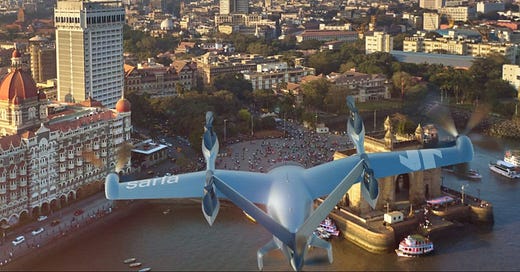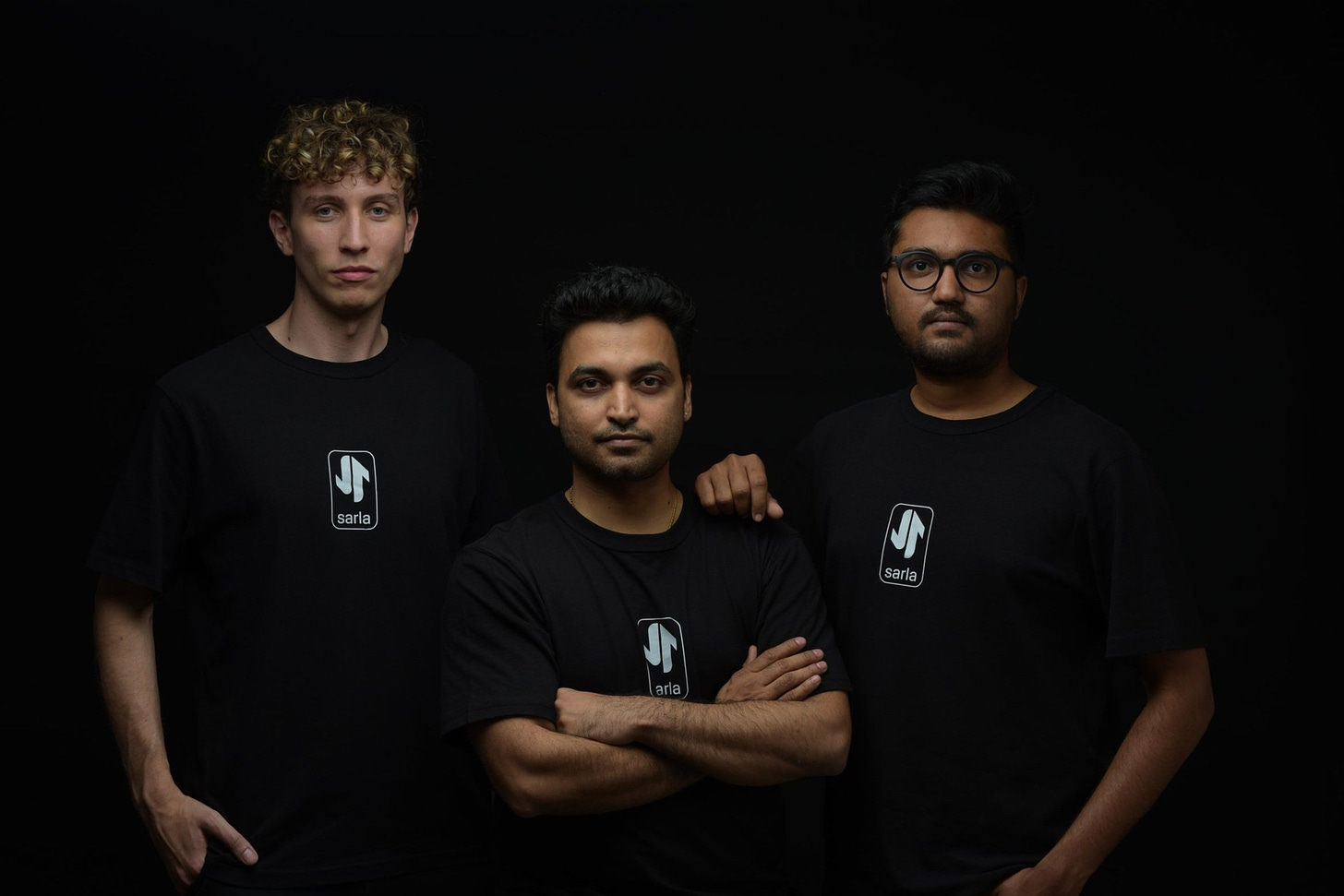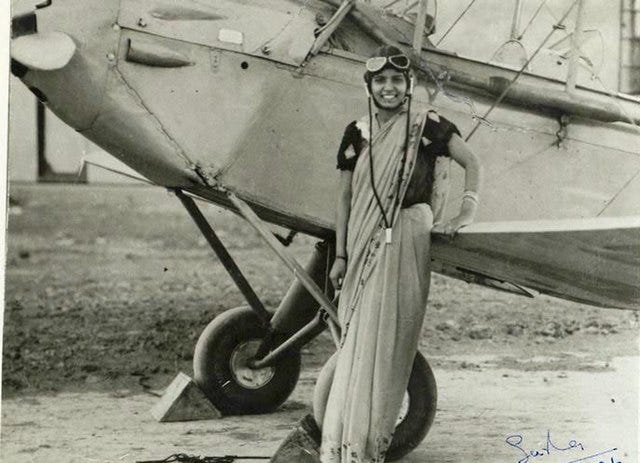05: Building Sarla Aviation: Adrian Schmidt's Venture in Democratizing Urban Air Mobility in India
From Germany to Bangalore - Building an eVTOL Startup in India and Market Insights by Adrian Schmidt, Co-Founder of Sarla Aviation
Hi Kula Readers👋
Today, we present an article on the exciting entrepreneurial journey of Adrian Schmidt 🇩🇪, who recently moved to Bangalore 🇮🇳 to democratize Urban Air Mobility in India. Alongside his co-founders Rakesh Gaonkar and Shivam Chauhan, Adrian is building Sarla Aviation, with a vision to develop India's first electric vertical take-off and landing (eVTOL) aircraft.
Imagine soaring above congested streets, effortlessly bypassing traffic jams in Mumbai or Delhi – that's the future Sarla envisions, making short distance aerial travel clean and accessible to everyone.
We spoke with him a few weeks after they emerged from stealth mode in January 2024.
Now, if the term "eVTOL" doesn't ring a bell, fear not!
eVTOL aircrafts are designed to take off and land vertically, akin to helicopters, but are powered by electric propulsion systems, promising quieter, more efficient, and environmentally friendly flight. This technology is set to revolutionize how we move and shape our urban landscapes, transforming the way we navigate our cities. Exciting, isn't it? 🚀
Key Takeaways 🔎
We're adding a summary at the beginning of each article for those who prefer a quick read:
India's Urban Air Mobility Revolution: Sarla Aviation, founded by Adrian Schmidt, Rakesh Gaonkar, and Shivam Chauhan, aims to democratize Urban Air Mobility in India, envisioning a future where aerial travel is clean and accessible to everyone, alleviating congestion in cities like Mumbai and Delhi.
Adrian's Entrepreneurial Journey: Adrian’s journey from Germany to India reflects his passion for transforming mobility and embracing challenges. With experience in automotive companies (Volkswagen, Nio) and at Lilium (a leading German eVTOL startup), Adrian brings strong knowledge, a global network, and an ambitious attitude to Sarla Aviation.
Strategic Decision to Establish Sarla in India: The decision to found Sarla in India stems from the country's growing strategic importance, rising need for alternative transportation solutions, increasingly supportive regulatory environment, and the significant gap in the Indian eVTOL market.
Competitive Strategy and Market Positioning: Sarla distinguishes itself by prioritizing affordability and catering to the Indian market's needs. Leveraging existing technologies and focusing on streamlining operations, Sarla aims to offer cost-effective eVTOL solutions without compromising safety or quality, positioning itself favorably in the competitive landscape.
Sarla: Pioneering Urban Air Mobility Transformation in India
In July 2023, Adrian Schmidt, Rakesh Gaonkar, and Shivam Chauhan established Sarla Aviation with the vision to revolutionize Urban Air Mobility in India. Adrian and Rakesh met while working together at the German eVTOL company Lilium, while Shivam was gaining experience as an engineer at the American competitor Joby Aviation. Having spent combined, more than five years working in top eVTOL companies across Europe and the US, they are now determined to bring this cutting-edge technology to India.
Sarla aims to bring transportation from a two-dimensional (subway and buses) into a three-dimensional plane field, through eVTOL aircraft which are more silent, cleaner, and safer than helicopters.
Why the name “Sarla”?
The company is named after Sarla Thakral सरला ठकराल, honoring her pioneering spirit and historic achievements in aviation. As the first Indian woman to earn a pilot's license in 1936 at just 21 years old, she shattered gender barriers and became a symbol of progress and inspiration. Just as Sarla Thakral ventured into uncharted skies, they aspire to chart new paths in transportation for India's rapidly growing cities. [Sarla Aviation]
Adrian's Journey: From Dreaming to Transforming Mobility 🌍
Originally from Germany, Adrian embarked on a bold journey when he relocated to Bangalore in September 2023 to establish Sarla. This marked his first trip to India; Adrian shared that he has always enjoyed throwing himself into cold waters, - doing something that a lot of people would consider to be crazy.
I strongly believe that when you do something that's way out of your comfort zone, you can almost only win. You can only grow as a person. You will only expand your horizon. You will only understand the planet that we all share better - Adrian Schmidt
Growing up, Adrian had a dream of becoming a car designer, which led him to enroll in a Transportation Design course at Hochschule Pforzheim University and later a Master's in Management and Strategic Design in New York. Reflecting on his aspirations, he shared, “I wanted to change the way we move. The idea of cars harming the environment on such a large scale seemed absurd to me."
His career path led him to renowned German automotive companies like Mercedes and Volkswagen. At Volkswagen, he witnessed the transition from internal combustion engines to electric vehicles following the Dieselgate scandal, which accelerated his interest in startups. Adrian recollects, "The shift had to happen in a very short period of time, which made a usual low-paced environment, a very fast-paced one. This exciting time inspired me to explore startups."
Subsequently, he joined Nio, a Chinese EV manufacturer, before finding his niche at Lilium, a Munich-based eVTOL company. It was at Lilium where he crossed paths with Rakesh Gaonkar, then the lead of the production loft development team, who would later become his co-founder.
It seems like they have all the credentials to be the founders of a startup that revolutionizes air mobility in India, right?
Building Sarla in India: Key Considerations and Strategic Insights
Adrian and his co-founders chose to establish Sarla in India for several key reasons:
India's Growing Global Importance: India's increasing strategic significance in the global market, coupled with its expanding middle class, offered an enticing opportunity.
Rising Demand for Alternative Transportation: With some of the world's most congested cities, there's a growing necessity for alternative modes of transportation in India. The existing infrastructure cannot keep up with the rising demand.
Positive Government Support for Energy Transition: The Indian government's supportive stance on energy transition, particularly its investments and encouragement of Electric Vehicle (EV) technologies, played a significant role. In March, they approved a new EV Policy to boost local production, following extensive lobbying, including with Tesla, which plans substantial investments in India [Reuters, Economic Times].
Untapped Opportunity in the Indian eVTOL Market: Recognizing the significant gap in the Indian eVTOL market, they found no major domestic competitors and minimal international presence. For example, Archer Aviation has recently announced plans to introduce an all-electric air taxi service in India by 2026, in collaboration with InterGlobe Enterprises [TechCrunch].
Welcoming Competition As It Validates The eVTOL Market Potential
Competition does not intimidate Adrian; instead, they welcome it as validation of the potential within the eVTOL market in India. While established players like Archer Aviation and others may eventually enter the Indian market, Adrian believes their approach sets them apart.
You might be wondering why
As first movers, Western Competitors invested significantly in developing sophisticated technologies, which, while engineering marvels, are also exceedingly complex and costly to develop.
Lilium has the world's most sophisticated eVTOL technology. It utilizes ducted electric fans, whereas competitors like Joby Aviation and Archer Aviation employ an open propulsion system. However, when comparing Lilium to Joby and Archer, it's akin to comparing a Ferrari to a Mercedes and a BMW.
As straightforward as it can be, high costs ultimately lead to higher prices for consumers.
Lilium has just been starting pre-sales and they're selling their aircraft between 7 to 10 million USD [AIN]. Archer Aviation and Joby Aviation have not publicly disclosed their numbers, but they sell anywhere between 3 to 5 million USD per aircraft if you look at their pre-order books.
Additionally, they have invested considerable time and resources in educating both the market and regulators. And, this journey is far from over.
Sarla's Strategy: Balancing Performance and Affordability for India's Needs
Sarla's focus on affordability and catering to price-sensitive markets distinguishes them from the mentioned competitors. They plan to streamline their approach by eliminating what they consider unnecessary technology that isn't truly relevant for their target customers. This entails reducing the number of moving parts to simplify their product and making compromises in certain areas. For instance, while competitors boast a range of about 250 kilometers per charge, they will offer a range of approximately 160 kilometers per charge. Also, they leverage existing technologies and off-the-shelf components to deliver cost-effective solutions without compromising safety and quality.
We prioritize meeting market needs over maximizing performance - Adrian Schmidt
Not being the first movers, but leveraging the lessons learned from them and maintaining a strong focus on the Indian market might provide a distinct advantage. This strategy should allow them to maintain lower prices than the mentioned competitors.
An Increasingly Supportive Regulatory Environment
Sarla adheres to international regulatory bodies such as the FAA in the United States and the EASA in the EU, which is also what is expected by the DGCA (Indian regulatory body in the field of Civil Aviation). Consequently, their aircraft are certified to standards comparable to those in Europe.
The regulatory environment in India increasingly supports the entire eVTOL sector. This was a key factor to convince them that now is the right time. Statements from the Minister for Civil Aviation expressing the desire to establish India as a global hub for eVTOL and eVTOL manufacturing further bolstered their confidence [The Hindu]. The State of Gujarat announced in January 2024 the signing of a Strategic Partnership Agreement with SkyDrive Inc., a Japanese eVTOL aircraft company, to collaborate on advancing the future of eVTOL aircraft operations in India. [SkyDrive]
While the exact legal framework and policies are still evolving, recent releases from the FAA and the EASA certifying eVTOLs as aircraft signify significant progress. This development is promising as it sets a standard that the rest of the world can reference.
They anticipate the formulation of policies in India and their certification within the next two to three years.
India's Progress in Electric Vehicle Manufacturing
While India's manufacturing capabilities may not currently match those of Europe, they have found the supply chain for prototyping to be well-developed. They source components both locally and internationally, leveraging ready-made parts to streamline their processes. However, when it comes to mass manufacturing, particularly in the electric vehicle sector, India is making significant strides.
Electrification of transportation is progressing rapidly, with major players like Tata investing in battery technology and manufacturing and the recently approved EV Policy to encourage local production of electric cars in the country. [Reuters]
Strategic Benefits of Manufacturing In India
There are two key benefits to manufacturing in India:
Avoiding Import Taxes: India currently imposes a tax of 70% or 100% on imported EVs, depending on their value (a primary reason for which Elon Musk was lobbying with the Indian Government). Avoiding such high taxes would enable them to maintain lower prices and prioritize affordability.
Close Government Support: As mentioned, the government is increasingly supportive of EV production in the country also in line with the “Make in India” policy.
Currently, none of the large eVTOL players mentioned earlier plan to establish manufacturing plants in India, as they receive significant government support to do so in their home markets. This is why Lilium manufactures in Germany and why Joby and Archer manufacture in the US.
Will they eventually consider manufacturing in India in 10 years?
Go-To-Market: Leveraging Airlines Operations
As most of the eVTOL competitors, they plan to leverage the operations of established airline companies that already have extensive experience in aerospace operations. In India, the main ones are Vistara, Air India, and IndiGo.
Raising Capital In India
Despite the current challenging venture capital environment in India [Bain Report], Adrian informed us that interest in Sarla Aviation has been quite high as they approach raising their seed round.
Adrian's Global Network: Bridging Continents and Cultures
Having studied and worked abroad for several years, Adrian has cultivated a global network. He's acquainted with many Indians currently working in Germany and is steadily connecting with more Germans and Europeans employed in India. Making friends is therefore not a challenge at all for Adrian. Consequently, despite the physical distance, he doesn't feel too far from Europe.
We then asked Adrian what the biggest challenge of having moved to Bangalore
“If I have to choose one, it is probably navigating the congestion and the air pollution, which are anyway the problems I want to solve” 🚀
Interested in Salra Aviation? Check out the open positions!
Join the discussion!
We hope you found Adrian's story as captivating as we did! We're eager to hear your thoughts on eVTOL, especially in the context of India.
Additionally, are you aware of other entrepreneurs who relocated to India to fund their ventures? We'd love to hear about them and their journeys.
Share your insights with us!








